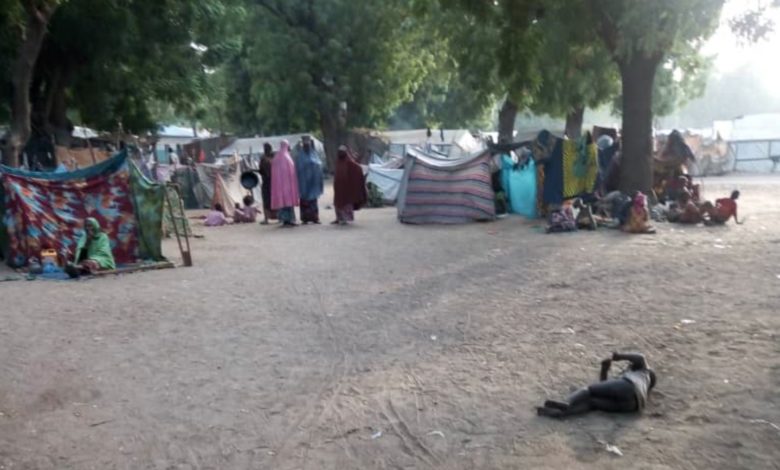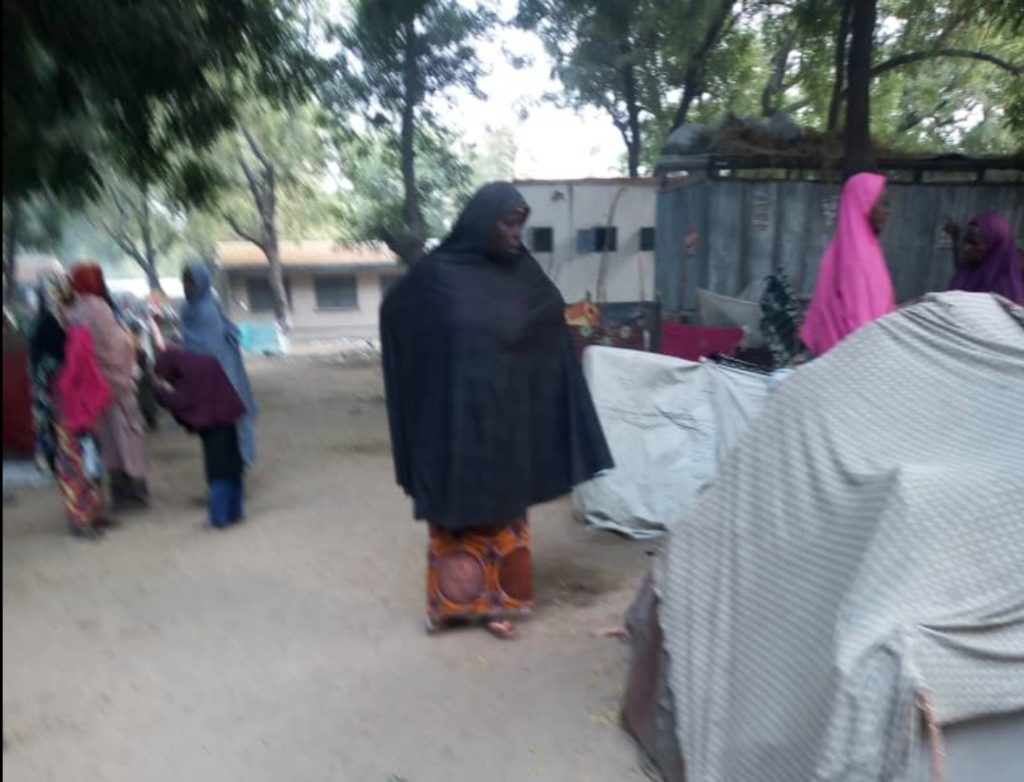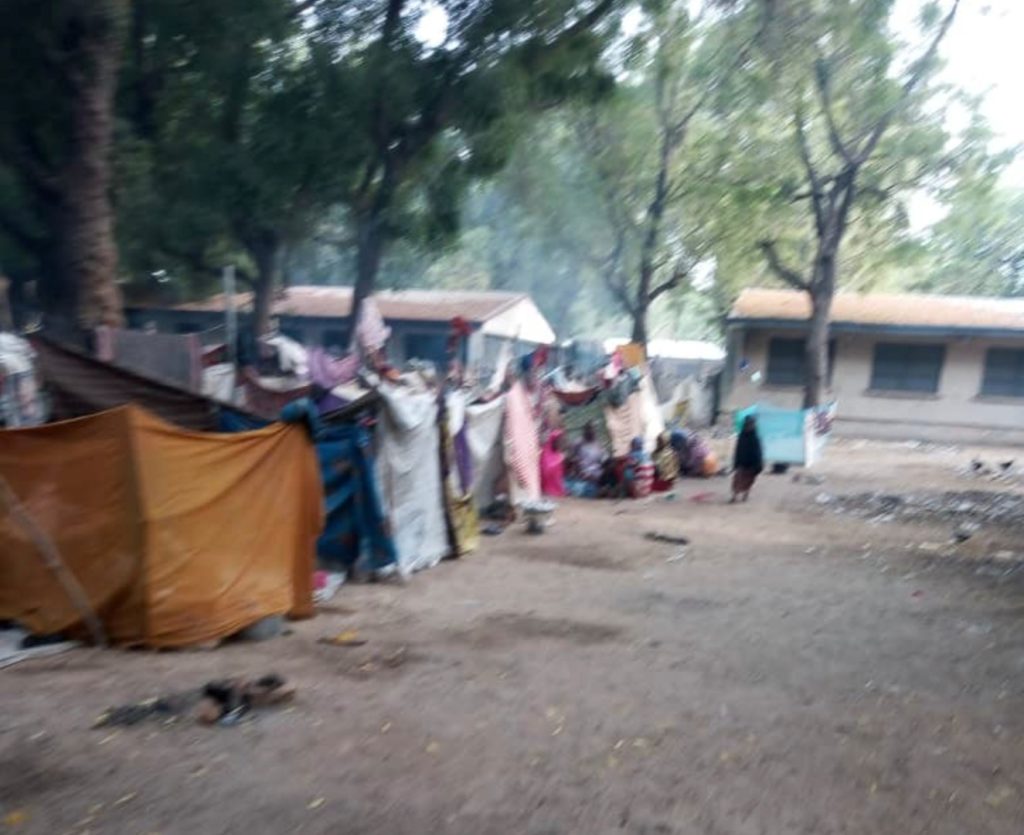Hunger, Destitution… Bama IDPs Return Home To Harsh Conditions
“Except for the food we receive from the governor from time to time, we don’t get anything.”

Internally Displaced Persons (IDPs) from Bama, Northeast Nigeria, who were returned to their hometown, face harsh conditions almost no different from their previous troubles in Maiduguri displacement camps.
In interviews with HumAngle, some complained of not getting food supplies for over a year despite huge government spending on resettling them, raising questions about possible gaps in implementation or whether essential supplies from the Borno state government are enough to cater to the returnees’ needs.
Yagana Umara is one of the IDPs who were returned after staying in Maiduguri, Borno state capital, for six years. “We were driven out by Boko Haram from Bama and went to stay in Maiduguri,” said Yagana, a 30-year-old woman with seven children.
She explained that she rushed down to Bama when the opportunity presented itself because of hunger and destitution back in Maiduguri. “It is poverty that brought us here,” lamented Yagana, who returned to her hometown with hope for a better life. Unfortunately, she and her family’s welfare conditions have not fared any better since the move.
“We didn’t get anything except for some assistance from one organisation,” she said, adding that they were managing to survive when HumAngle asked who was feeding them.
The Borno State Government has embarked on a sustained initiative to return IDPs to their hometowns to close camps in the state by May this year. The initiative, which started in 2016, gained momentum in May 2019 when the current governor, Professor Babagana Umara Zulum, was sworn in.
The governor, who was a commissioner of the newly created Ministry of Reconstruction, Reintegration and Resettlement during the preceding administration of Governor Kashim Shettima, implemented most of the reconstruction projects in the state. Since his election, he returned thousands of IDPs to their hometowns, including displaced persons living in neighbouring Niger and Cameroon Republics.
Bama town is so far the highest beneficiary of the state’s reconstruction projects. Its IDPs were among the first set to be returned in 2016 after Gamboru Ngala, Kala Balge, Mafa, Gwoza, Damasak and Dikwa.
The state government’s sustained supply of food to these returnees is complemented by some international non-governmental and donor organisations, further encouraging the IDPs’ mass return despite security concerns. But even with the concerted efforts, IDPs repeatedly complain of hunger.
Asta, a 50-year-old returnee from Bama, said, “It was hunger that brought me here.” During her four-year stay at the Jiddari Polo area in Maiduguri, the elderly woman said, “I didn’t get even a cube of Maggie.” Asta added that since her return to Bama, Mercy Corps, a global humanitarian aid organisation, gave her group food for six months. After that, and for about a year now, she has not received any support.
Adama is another returnee from Bama who has not gotten food for 11 months since Mercy Corps’ intervention. “We were fed by our children,” said the elderly woman when asked how she managed to survive.
Amina is a widow with five children who returned to Bama after staying in Maiduguri as an IDP for four years. She has been in Bama for three years as a returnee and has felt the pangs of starvation since her arrival. “Except for the food we receive from the governor from time to time, we don’t get anything,” she said.
The Borno State Government has been providing support to the displaced community through the State Emergency Management Agency (SEMA) since 2015, when IDPs started arriving in the state capital. With the humanitarian challenge proving too huge for the state and federal governments to shoulder, non-state actors arrived at the scene to render support. The state government has additionally rendered aid even to IDPs residing in neighbouring countries.
The Borno State Commissioner of Information, Alhaji Baba Kura Abba Jato, earlier asserted in an interview with HumAngle, that Bama was settled. However, there were “communities and villages and even hamlets which have been destroyed by the insurgents and are still in IDP camps in Bama.”
“You also have some of them who are not even within Nigeria; some are in Cameroon, in Boso, Niger Republic, and so on. The Borno state government still extends its hands of support for the refugees living out there. Relief materials being taken to them almost on monthly bases are enough for the government to contain their immediate needs,” he added.
It has been reported on several occasions that the Borno state governor has distributed food items to IDPs/returnees, including those living in Bama. The governor, on most occasions, distributed the food items by himself to ensure they reached the intended beneficiaries. This is why current affairs analyst, Mustapha Gana, believes the returnees’ conditions may not be best described as acute starvation.
“There cannot be such a level of starvation seeing the frequency of food distribution by the governor himself to the returnees,” Mustapha said, drawing an analogy. He concluded that the food ration to the returnees was either not corresponding to the needs and size of the household beneficiaries or the frequency of the distribution needed to be adjusted to address the gaps.
This special report is part of a series of publications supported by the African Transitional Justice Legacy Fund under HumAngle’s ‘Mediating Transitional Justice Efforts in North-East’ project.
Support Our Journalism
There are millions of ordinary people affected by conflict in Africa whose stories are missing in the mainstream media. HumAngle is determined to tell those challenging and under-reported stories, hoping that the people impacted by these conflicts will find the safety and security they deserve.
To ensure that we continue to provide public service coverage, we have a small favour to ask you. We want you to be part of our journalistic endeavour by contributing a token to us.
Your donation will further promote a robust, free, and independent media.
Donate HereStay Closer To The Stories That Matter






